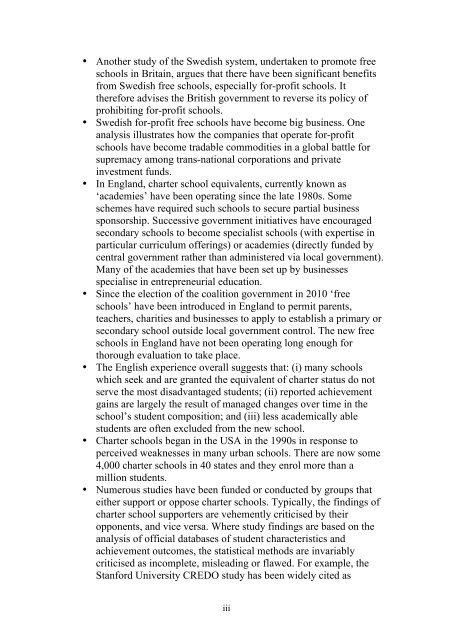Eprg charter schools for new zealand report
Eprg charter schools for new zealand report
Eprg charter schools for new zealand report
Create successful ePaper yourself
Turn your PDF publications into a flip-book with our unique Google optimized e-Paper software.
• Another study of the Swedish system, undertaken to promote free<br />
<strong>schools</strong> in Britain, argues that there have been significant benefits<br />
from Swedish free <strong>schools</strong>, especially <strong>for</strong>-profit <strong>schools</strong>. It<br />
there<strong>for</strong>e advises the British government to reverse its policy of<br />
prohibiting <strong>for</strong>-profit <strong>schools</strong>.<br />
• Swedish <strong>for</strong>-profit free <strong>schools</strong> have become big business. One<br />
analysis illustrates how the companies that operate <strong>for</strong>-profit<br />
<strong>schools</strong> have become tradable commodities in a global battle <strong>for</strong><br />
supremacy among trans-national corporations and private<br />
investment funds.<br />
• In England, <strong>charter</strong> school equivalents, currently known as<br />
‘academies’ have been operating since the late 1980s. Some<br />
schemes have required such <strong>schools</strong> to secure partial business<br />
sponsorship. Successive government initiatives have encouraged<br />
secondary <strong>schools</strong> to become specialist <strong>schools</strong> (with expertise in<br />
particular curriculum offerings) or academies (directly funded by<br />
central government rather than administered via local government).<br />
Many of the academies that have been set up by businesses<br />
specialise in entrepreneurial education.<br />
• Since the election of the coalition government in 2010 ‘free<br />
<strong>schools</strong>’ have been introduced in England to permit parents,<br />
teachers, charities and businesses to apply to establish a primary or<br />
secondary school outside local government control. The <strong>new</strong> free<br />
<strong>schools</strong> in England have not been operating long enough <strong>for</strong><br />
thorough evaluation to take place.<br />
• The English experience overall suggests that: (i) many <strong>schools</strong><br />
which seek and are granted the equivalent of <strong>charter</strong> status do not<br />
serve the most disadvantaged students; (ii) <strong>report</strong>ed achievement<br />
gains are largely the result of managed changes over time in the<br />
school’s student composition; and (iii) less academically able<br />
students are often excluded from the <strong>new</strong> school.<br />
• Charter <strong>schools</strong> began in the USA in the 1990s in response to<br />
perceived weaknesses in many urban <strong>schools</strong>. There are now some<br />
4,000 <strong>charter</strong> <strong>schools</strong> in 40 states and they enrol more than a<br />
million students.<br />
• Numerous studies have been funded or conducted by groups that<br />
either support or oppose <strong>charter</strong> <strong>schools</strong>. Typically, the findings of<br />
<strong>charter</strong> school supporters are vehemently criticised by their<br />
opponents, and vice versa. Where study findings are based on the<br />
analysis of official databases of student characteristics and<br />
achievement outcomes, the statistical methods are invariably<br />
criticised as incomplete, misleading or flawed. For example, the<br />
Stan<strong>for</strong>d University CREDO study has been widely cited as<br />
! iii!


